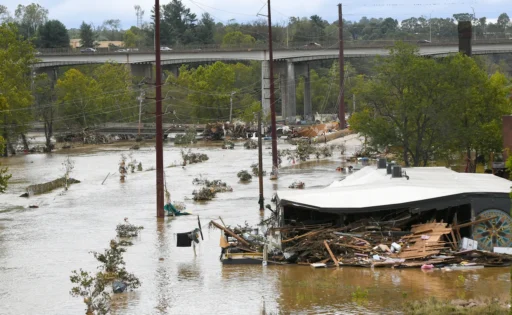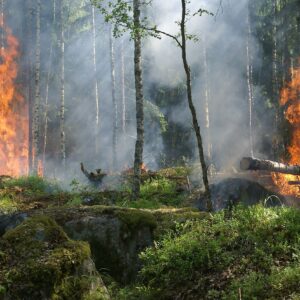I wasn’t there when Asheville was devastated by Hurricane Helene.
*
I wasn’t there when the Temple in Jerusalem was destroyed.
*
[The Lord] has destroyed His Tabernacle…
The Lord has rejected His altar,
Disdained His Sanctuary.
He has handed over to the foe
The walls of its citadels;
They raised a shout in the House of the Lord
As on a festival day.
Lamentations 2:6-7
*
Oh, my Lord, my Lord, my Lord.
*
The Lord, Whoever, Whatever, and However the Lord is, didn’t destroy Asheville. Rain did. Wind did.
*
Eight days before the weather turned against us—
No! That’s not right. The weather didn’t turn against us. The weather did what weather does. It didn’t choose to punish us, the “cesspool of sin.” It didn’t choose to humble us, Asheville, the “Paris of the South.”
September 17, eight days before the storm, my wife and I left town. First stop, D.C. to visit our son and his partner. Next stop, New Rochelle, N.Y. to visit our daughter and her boys. Monday, September 30, the day after a “Yetzirah: A Hearth for Jewish Poetry” retreat for the board and staff in Manhattan: head home. Settle back just in time for the first night of Rosh Hashanah, the Jewish New Year. That was the plan.
*
According to Jewish tradition, the Second Temple was destroyed on Tisha B’av, the ninth day of the Jewish month Av, in 70 CE. The first Temple was destroyed on the same day in 586 BCE. Over the course of the centuries, many other calamities befell the Jewish people on that day. So, Tisha B’av, in Jewish tradition, is a day of mourning. A full fast. Sitting on the ground chanting “Lamentations” by candlelight.
He has made me dwell in darkness,
Like those long dead.
He has walled me in and I cannot break out;
He has weighed me down with chains.
And when I cry and plead,
He shuts out my prayer…
Lamentations 3:6-8
*
Be glad you’re not here. Quite a mess, no power, and lots of flooding. A serious disaster.
I received that message from a friend on Friday, Sept. 27, at 8:31 a.m., three days before our planned return to Asheville.
Same morning, 8:57 a.m.:
Pretty freaking watching trees come apart. A few more hours of wind I’m afraid.
Saturday, September 28:
Momentary internet at the emergency command center on Broadway. Terrible here. Don’t rush home.
Same day, 45 minutes later:
Have someone check on your house and stay longer. There won’t be much you can do for your house if you’re here…. It’s a bloody mess.
*
In the 1970s, on occasion I prayed at what remains of the Second Temple: the Kotel, the Western Wall, the so-called Wailing Wall, the retaining wall that supported the Temple Mount. Once, on Tisha B’av 1978 or ‘79, I joined thousands of Jews weeping and praying at the Kotel. I worked my way through the crowd until, as I got closer to the wall, I felt pulled into a vortex. All that prayer, all that grief concentrated and swirling and directed at the massive stones, row after row stacked atop one another. Still, it wasn’t grief, not exactly, that I felt. I knew the story of destruction. But even there, at the so-called holiest place for Jews and at such a highly charged spiritual moment, I didn’t feel as if I were living the story. Maybe if, in a past life, I had been there in 70 CE….
*
They FaceTimed with us, my wife’s ex-husband and his wife, so we could see our house with our own eyes. While we were gone, they had checked on our house several times, and, among other things, emptied our refrigerator and freezer of rotting food. On this latest visit, a few days before our return, cell service was unstable. Internet hadn’t been restored. But, after a sixteen-day outage, we had power. And, after a longer period without water, water was flowing again through our pipes. But it wasn’t potable. Twenty-three days after the storm, we returned to Asheville. To this day, thirty-five days since the storm, the water still isn’t potable.
*
Tisha B’av is the day, argues Rabbi Alan Lew in This is Real and You Are Completely Unprepared: The Days of Awe as a Journey of Transformation, that we begin the process of turning. “Tisha B’av is the moment of turning, the moment when we turn away from denial and begin to face exile and alienation as they manifest themselves in our own lives–—in our estrangement from God, in our alienation from ourselves and from others.”
*
Adonai, our God, embrace your people and their prayer. Restore worship to Your sanctuary. I say that prayer whenever I attend Shabbat services. Today, for me the Kotel is still a vortex, though now it’s a vortex of alienation: ultra-Orthodox Jew from progressive, egalitarian Jew; Israeli Jew from Palestinian Muslim…. I should pray, Lord, forget that sanctuary, that Temple in Jerusalem! Let the whole earth be Your sanctuary!
*
On the news—I can’t remember if it was local or national news—a climate scientist. She had recently relocated from Florida to Asheville. Asheville was considered by her and many others, including climate refugees from New Orleans after Katrina, as a climate haven. A kind of Eden. She pledged to stay here. To help rebuild Asheville in a way that is more resilient, given the climate reality in which we now live.
*
On my desk, between my keyboard and my external monitor, three fountain pens—a violet Lamy Safari, an imperial blue Lamy Studio, a black Lamy 2000—and a brushed silver Lamy Studio rollerball. I purchased them at my favorite store in Asheville’s Biltmore Village: Origami Ink. I visited with owners Jonathan and Cathie often and couldn’t resist buying something from them—a pen, ink, a Rhodia notebook, a handmade greeting card—every time I stopped by.
From the Origami Ink website:
Sad news, Friends… Our physical store in Biltmore Village has been completely destroyed. It’s been devastating for us and has been emotionally hard to process or even get our minds around. The flood waters basically swirled all the way to the ceilings, literally smashing everything to bits and leaving everything coated in toxic mud.
Visiting Origami Ink was part of my therapy. I regularly shopped at the store, happy to see my friends the owners, on my way either to or from my therapist’s office, a block from Origami Ink.
*
While I was still in New Rochelle, New York, I received a text message from my therapist of thirty years. I don’t think I’ll be returning to the office. Take good care. Love …. I don’t know how her office, also in devastated Biltmore Village, fared, what became of the copious notes she took during our sessions and sessions with countless others.
*
Waters flowed over my head;
I said: I am lost!
Lamentations 3:54
*
I wasn’t there when the Temple was destroyed.
I wasn’t here when Asheville was devastated by punishing rain and wind. Punishing—wrong! Rain and wind do what rain and wind do. But I, we, have a choice. Let us search and examine our ways, / And turn back, writes prophet-poet Jeremiah, whom tradition identifies as the author of Lamentations. Turn back to whom, to what? Jeremiah says “God.” Where’s God? I don’t know. Until I do, I’ll turn toward others with love and compassion. And informed by science, I’ll turn toward the earth and do what I can to learn to live respectfully and wisely with it. “Earth’s the right place for love,” writes Robert Frost. “I don’t know where it’s likely to go better.”
Richard Chess has published four books of poetry, the most recent of which is Love Nailed to the Doorpost. Professor emeritus from UNC Asheville, where he directed the Center for Jewish Studies for 30 years, Chess serves on the boards of Yetzirah: A Hearth for Jewish Poetry and Black Mountain College Museum + Arts Center, where he co-directs its Faith in Arts project. You can find him at www.richardchess.com .





